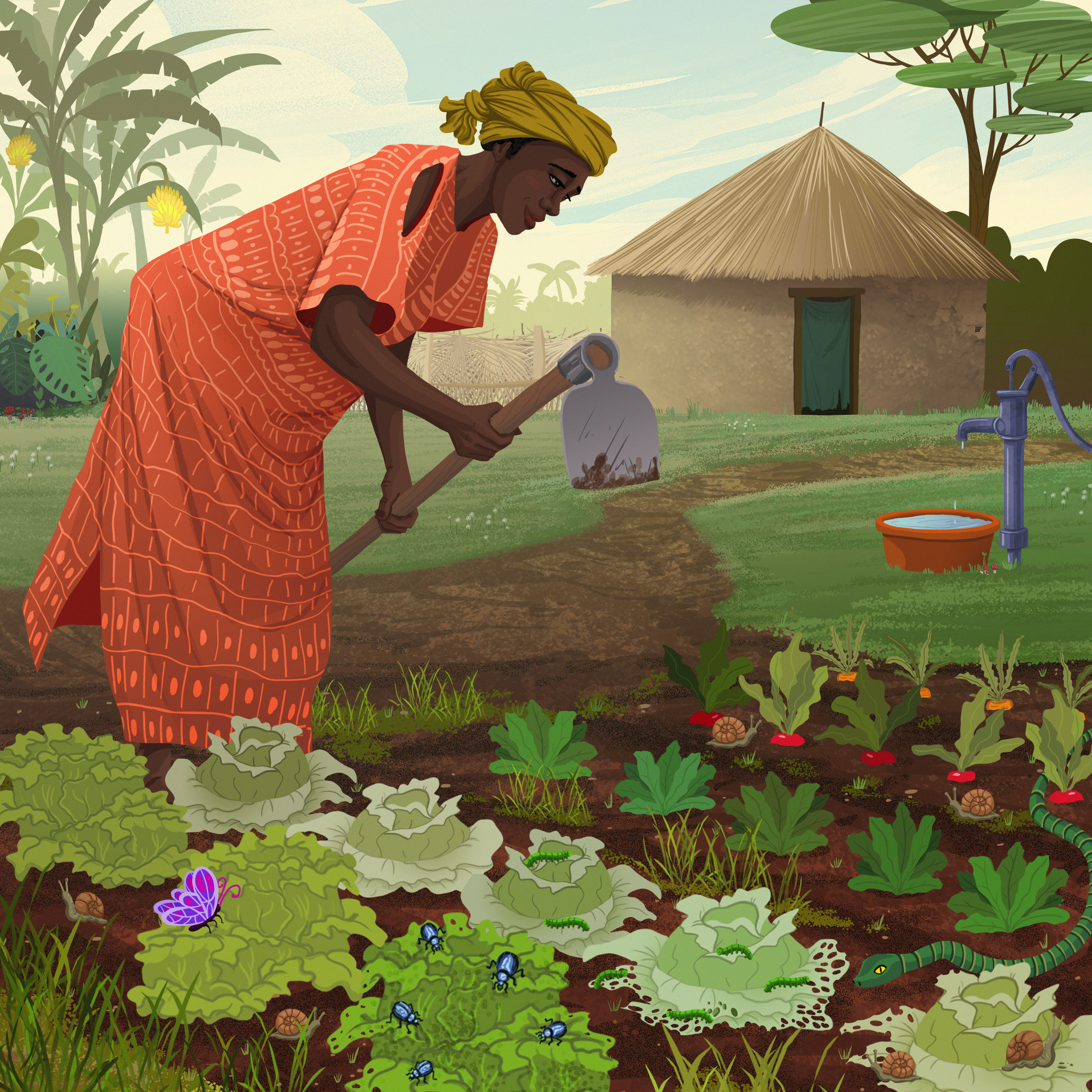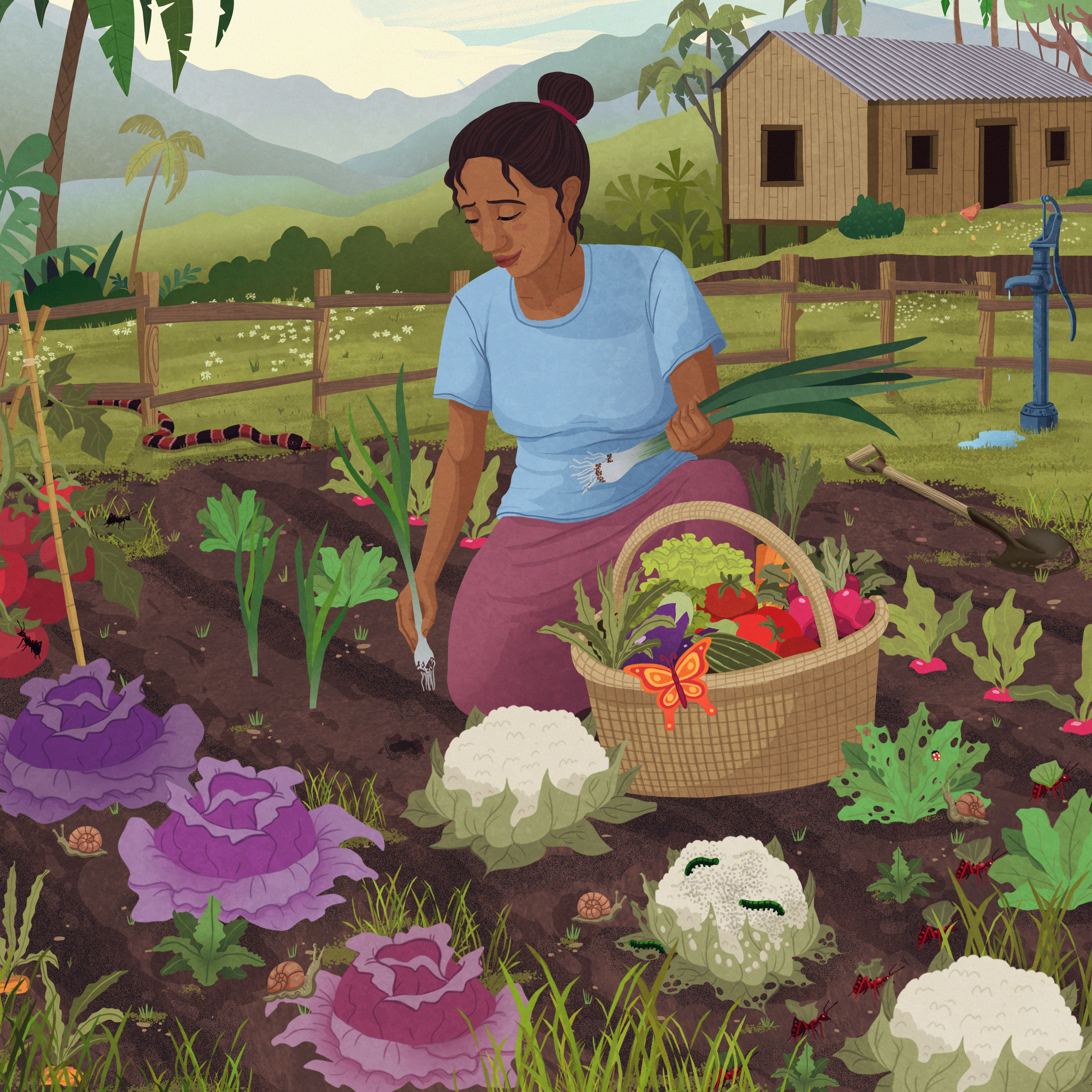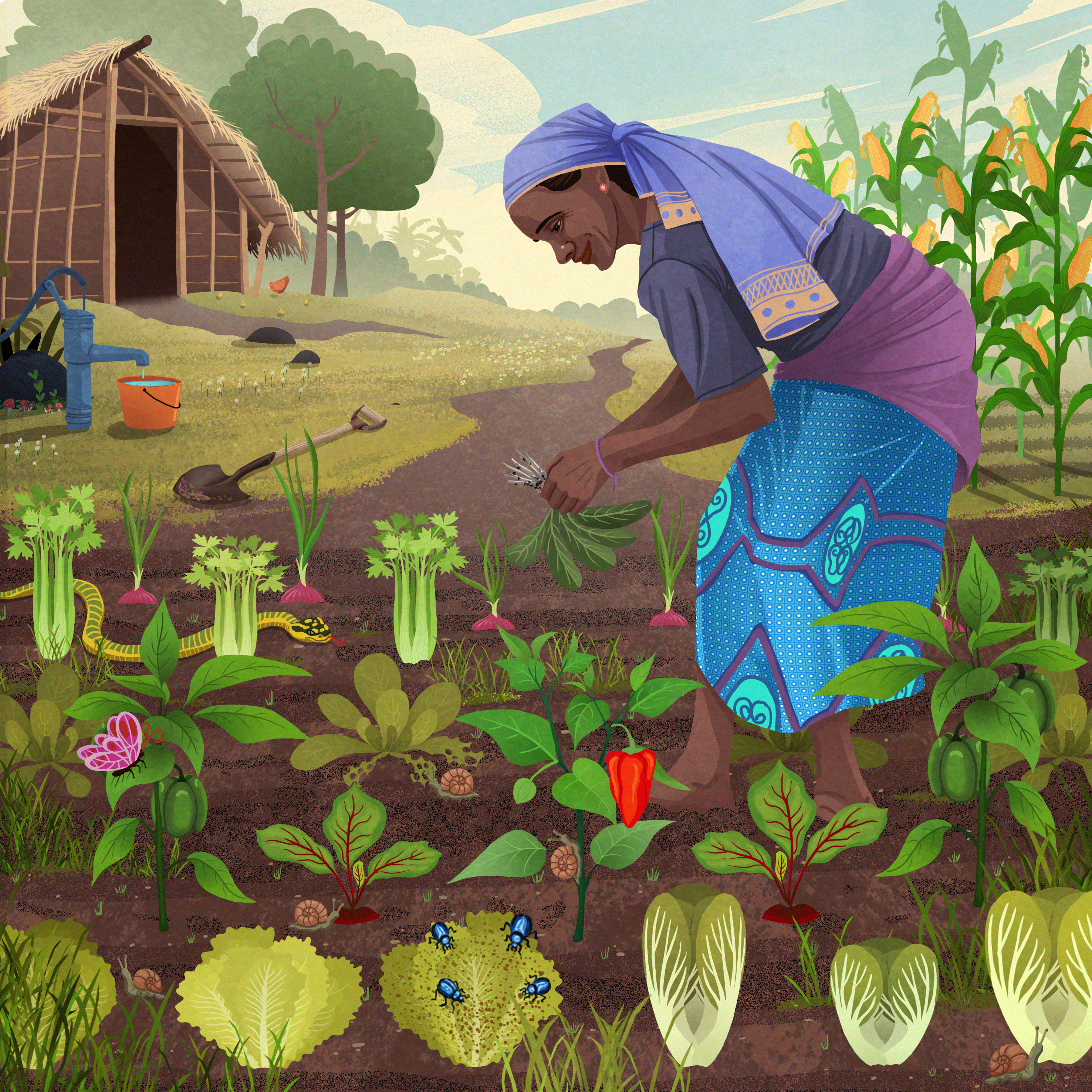Global Child Protection Parenting Curriculum
Year 2, Lesson 2: A Garden Under Attack
Time Needed: 45 minutes
Garden Images:



Index
Teacher Preparation
Introduction
New Ideas
Caregiver Connection
Application/Activity
Reflection
Closing
Teacher Preparation
Objectives
The caregiver will be able to:
- Hear a parable about how God’s love for us demonstrates proper love for our children.
- List reasons that parents resist loving their children as God loves us.
- List wise parenting principles that choose what is good for a child’s heart, mind, and body.
- Explore ways to overcome our heart’s resistance to loving our children unconditionally.
Materials
- Chalkboard and chalk
- Garden image
Preparation
- Read the lesson and reflect on how to teach it wisely.
- Skim previous lesson. Prepare to have a quick review at the beginning of class.
Introduction
5 minutes
![]()
In the last lesson we explored how God demonstrated love to humans from the beginning. In Genesis 1 he placed humans in a perfect garden, blessed them and generously provided all they needed. We know that God still loves us and continues to show us care in our everyday lives, leading us to do the same with our children. During this last week, you hopefully paid attention to some ways God personally loves and cares for your family.
- What is one way you noticed God care or provide for your family? Accept answers.
Unfortunately, the ideal garden God created didn’t last.
- What happened to destroy the perfection and provision God offered humans at creation? Possible answers to this question may include: The serpent came in. The humans doubted God’s love. They rejected his ways. Humans left the perfect garden. If no one is familiar with this story, explain how the good garden God created was ruined when an enemy invaded the garden and led Adam and Eve to disobey God. Christians believe that even though God loves us, evil is present in our world because humans rejected his love and provision.
Look at our image of the garden.
- What are the dangers or intrusions visible or hidden in the garden? Accept answers. Possible answers may include; a snake that produces fear; insects that eat the plants or spread disease; poor weather; floods; too much sun or wind.
- How would a good gardener respond to these intrusions? Accept answers. The gardener would get rid of the insects and protect the plants from too much heat, wind or rain.
This garden image represents our children’s minds, hearts and bodies. Caretakers and parents are meant to be wise gardeners who protect children against all the dangerous lies and evil that might damage them. Today we will explore some of the ways we can become wise gardeners who can respond to the lies and dangers present around us and in us so we can help our children grow in love.
In today’s lesson, you will be able to:
- Hear a parable about how God’s love for us demonstrates proper love for our children.
- List wise parenting principles that choose what is good for a child’s heart, mind, and body.
- List reasons that parents resist loving their children as God loves us.
- Explore ways to overcome our heart’s resistance to loving our children unconditionally.
New Ideas
10 minutes
![]()
A story in the Bible that beautifully illustrates how God sees and loves us like children is found in the gospel of Luke. As you hear the story, think about the character most like yourself.
Luke 15:11-32
11 Jesus continued, “There was a man who had two sons. 12 The younger son spoke to his father. He said, ‘Father, give me my share of the family property.’ So the father divided his property between his two sons.
13 “Not long after that, the younger son packed up all he had. Then he left for a country far away. There he wasted his money on wild living. 14 He spent everything he had. Then the whole country ran low on food. So the son didn’t have what he needed. 15 He went to work for someone who lived in that country. That person sent the son to the fields to feed the pigs. 16 The son wanted to fill his stomach with the food the pigs were eating. But no one gave him anything.
17 “Then he began to think clearly again. He said, ‘How many of my father’s hired servants have more than enough food! But here I am dying from hunger! 18 I will get up and go back to my father. I will say to him, “Father, I have sinned against heaven. And I have sinned against you. 19 I am no longer fit to be called your son. Make me like one of your hired servants.” ’ 20 So he got up and went to his father.
- What did the younger son in this story do? He asked for his inheritance early; he wasted the money on wild living; he moved far away; he used all the money.
- What were the consequences of these choices? He didn’t have what he needed; he ended up feeding pigs; he was distanced from his father.
- How did the younger son imagine his father would respond if he returned and confessed? He thought his father might give him a servant job.
Ask the group to turn to another participant and discuss:
- If you were in this father’s position, how do you think you would respond to this son? Accept answers.
A first century Jew who heard Jesus tell this story would have understood that the younger son had reached the lowest possible level when he ended up with the pigs. In this culture, the pig was unclean. This son was in the lowest position in society. He was poor and starving and realized his need for help.
Listen to how the father responded when the son returned:
“While the son was still a long way off, his father saw him. He was filled with tender love for his son. He ran to him. He threw his arms around him and kissed him.
21 “The son said to him, ‘Father, I have sinned against heaven and against you. I am no longer fit to be called your son.’
22 “But the father said to his servants, ‘Quick! Bring the best robe and put it on him. Put a ring on his finger and sandals on his feet. 23 Bring the fattest calf and kill it. Let’s have a feast and celebrate. 24 This son of mine was dead. And now he is alive again. He was lost. And now he is found.’ So they began to celebrate.”
- How did the father respond to the unwise son? He waited for his son, saw him and ran to meet him; he was filled with tender love; he gave him a robe, ring and sandals; he feasted and celebrated his return.
- Why do you think the father allowed the son to make such unwise decisions? Accept answers. This is a difficult question, and there are no “correct” answers.
There was another son in the story. He lived a very different life than his younger brother. Listen to how he responds to his brother’s return:
25 “The older son was in the field. When he came near the house, he heard music and dancing. 26 So he called one of the servants. He asked him what was going on. 27 ‘Your brother has come home,’ the servant replied. ‘Your father has killed the fattest calf. He has done this because your brother is back safe and sound.’
28 “The older brother became angry. He refused to go in. So his father went out and begged him. 29 But he answered his father, ‘Look! All these years I’ve worked like a slave for you. I have always obeyed your orders. You never gave me even a young goat so I could celebrate with my friends. 30 But this son of yours wasted your money with some prostitutes. Now he comes home. And for him you kill the fattest calf!’
31 “ ‘My son,’ the father said, ‘you are always with me. Everything I have is yours. 32 But we had to celebrate and be glad. This brother of yours was dead. And now he is alive again. He was lost. And now he is found.’ ”
- How did the older brother respond to these events? He was angry; he refused to celebrate; he responded with jealousy and resentment for his hard work and obedience.
- How did the father respond to his older son? His father went to him and begged him to come to the family celebration; he tells him that he is always with him and that everything he has belongs to him.
- What surprises you about how the father doesn’t respond to his sons? Accept answers. Possible answers may include: he doesn’t get angry; he doesn’t shame; he doesn’t control; he doesn’t even punish.
This father offers unconditional love to both his sons. All of us need this kind of love. There is no safety when love is conditional. That’s not even love. When we tell our children with words or actions we will only care for them if they are good, if they perform well in school, if they make the right choice or make us look good—we are not loving them, and they will not feel safe.
Unconditional love means choosing what is good for their heart, mind, and body even when they disobey, disappoint or reject us. It is not easy to parent like this; it is easy to respond in frustration or anger when our children do not act the way we desire. But if we want to provide a safe place for our children, we must learn to become more like the father in this story. The father allows both sons to make unwise decisions. He knows they are choosing what is selfish, yet he doesn’t respond in anger. He doesn’t shame them. He doesn’t withhold love or blessing from them.
Let’s discuss some of the reasons we resist loving our children in this way. Allow participants to give some of their ideas. As the participants share, write their ideas on the board and then read them back to them at the end. Possible answers may include but are not limited to:
- They’ve made choices that irritate us, and we find it difficult to love.
- We are afraid they will misbehave more if we don’t let them know we’re upset.
- We have emotions toward them such as: anger, frustration, shame, pride.
- Others are watching us parent and we feel pressure to show them we are in control.
- There is competition with other parents.
- There are family patterns of sin that we don’t recognize.
After this discussion, ask participants:
- How do you think we can remove these obstacles so that we can better love our children? Accept all answers.
Caregiver Connection
10 minutes
![]()
The truth is parents and caregivers resemble the characters in this story. We are all like the younger son, choosing things that are not good for us and needing the embrace of a loving father. We are all resistant to love, feel unnoticed and jealous of the love others get. And we all have opportunities as parents to demonstrate forgiveness and love like the father. No matter how good our children are, they will all make unwise choices or resent us at times.
There are five principles found in this story of a father who loves unconditionally. Let’s look at them and explore together some practical ways we might apply them in our everyday lives. As you listen to these five principles and their descriptions, learn the hand motion associated with each one and try to think of ways you might apply these principles in your own parenting lives. At the end, you and a partner will try to recall the principles and hand motions and share your example.
Demonstrate each hand signal/motion for the participants. Additionally, you might show them the images associated with each or consider drawing them on the board. Ask participants to do the motion in unison.
1. Allow natural consequences.

Hand signal: Open hands
Just as the father allowed his son to experience the suffering that came with poor choices, as children grow into adulthood, we need to allow them to feel natural consequences when they make mistakes. Rather than lecture or shame our children, we can allow events to unfold and choose to still love them unconditionally.
2. Give freedom to choose.

Hand signal: Wave an imaginary flag.
We can’t allow children to make all the choices, especially young children. For example, we wouldn’t allow a toddler to cook over a fire or a young girl to walk in an unsafe area without supervision. But when there is an opportunity for a child or adolescent to make a choice that isn’t unsafe, we allow them freedom to choose so they can mature. This lets them learn that mistakes are okay, and you will still love them.
3. Speak truth.

Hand signal: Cup both hands over the mouth, as if to make an announcement.
Even if it upsets or angers our children, we must speak the truth to them. We remind them that we are responsible to keep them safe. We tell them that freedom comes with responsibility, that we have high expectations and care about their maturity. We also remind them they belong to us and will be loved no matter what. We see the father in this story speak truth to his sons.
4. Teach by example.

Hand signal: Point out into the distance as if to point the way.
Lessons are generally caught more than they are taught. If we want our children to mature and know real love, we will demonstrate sacrificial love for them. We will choose to resist what is evil. We will not use anger to control family members and we will seek to live moral lives.
5. Celebrate.

Hand signal: Put hands up and open fingers like a firework going off.
Many cultures have celebrations woven into the year. Your family may have many traditions to celebrate throughout the year. Make it a point to recognize when your child has taken a new step in maturity. Like the father in our story, rejoice when they have made a wise choice. This can be done in very simple ways such as using words of praise in front of another adult about their growth or buying them a small sweet. Celebration may even take the form of allowing your child more freedoms because they’ve shown they are more responsible.
Application/Activity
15 minutes
![]()
- Review the five principle titles and their motions again.
- Optional as time permits: Invite participants to talk about these with their partner and give any examples of how they have or have not followed these with their own children. This might help caregivers think of examples and prepare them for the following activity.
- Divide the class into five small groups.
- Assign one principle to each group.
- Ask each groups to discuss and come up with a short example of this principle they could act out for the class.
- Instruct them to choose one caregiver who will act like a child and another one who will act as a parent. If others can be involved in the drama, even better.
- Encourage the caregivers to use real examples from their own parenting if possible.
After the five skits, invite participants to discuss what they think of the principles. Do they find them practical or helpful?
Reflection
4 minutes
![]()
Jesus tells this parable of the lost son right after two other parables about things that get lost and found. First there was a lost sheep, and a shepherd goes to find it. Everyone celebrates. Then there is a lost coin, a woman looks and finds it. Everyone celebrates. Then there is this lost son who is lost and found. Everyone celebrates…everyone except the older son. He’s the one person in all the stories who doesn’t join the celebration. He is too angry and proud. The first son takes unwise action. The second son has an unwise heart. Both sons were lost and needed to be found and loved.
Each of us is lost and needs to be found too. We each need the unconditional love of a parent. When we receive God’s love for ourselves, we can give that love away to our children. The opposite is true too: when we refuse to accept God’s love, we struggle to offer love to our children. Wise caretaking involves paying attention to our own hearts and action. We will not be perfect as caretakers, but we can allow God to lead us to become more like this father—so we can live out these principles and love our children.
Take a minute to silently reflect on how your own actions and heart resist love. Think about the following two questions:
- What are some of the ways you feel like the sons in this story?
- How does God want to embrace you like the good father?
Closing
1 minute
![]()
In this lesson, you:
- Heard a parable about how God’s love for us demonstrates proper love for our children.
- Listed wise parenting principles that choose what is good for a child’s heart, mind, and body.
- Listed reasons that parents resist loving their children as God loves us.
- Explored ways to overcome our heart’s resistance to loving our children unconditionally.
The more we practice reflecting on our own need for love and the more often we go to the father, the more we will receive wisdom from him on parenting our children. The enemy will regularly lie to us, and we will continue to feel tempted toward anger, jealousy, pride. We will still make unwise decisions in parenting at times. But God is faithful to forgive and receive us. He celebrates us when we call to him for help.
![]()